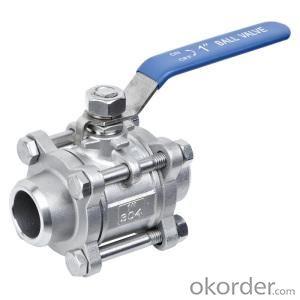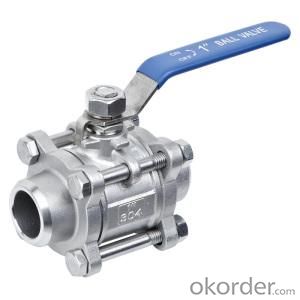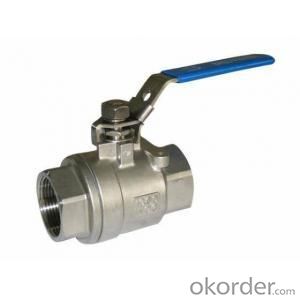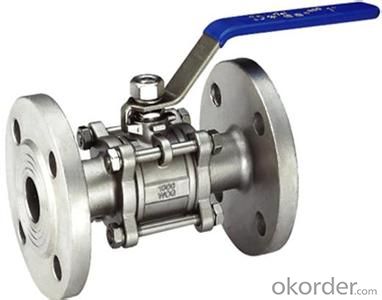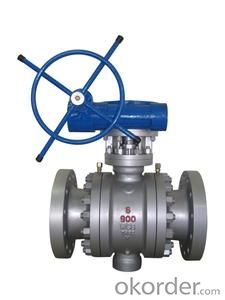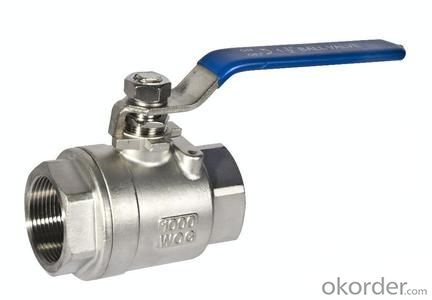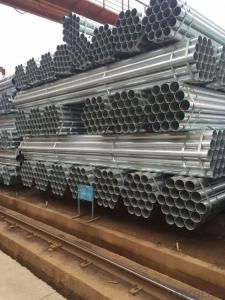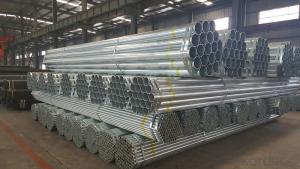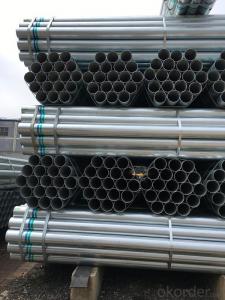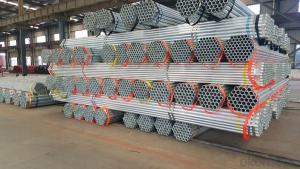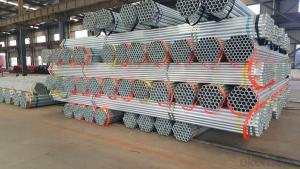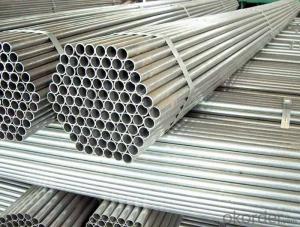STEEL BALL VALVE ASTM, NACE, ASME, and API standards..
- Loading Port:
- Shanghai
- Payment Terms:
- TT OR LC
- Min Order Qty:
- 1 pc
- Supply Capability:
- 10000 pc/month
OKorder Service Pledge
OKorder Financial Service
You Might Also Like
Specifications
1. ASTM, NACE, ASME, and API standards..
The Discription of Ball Valve
Product Description
Technical Specification
| Design standard | API Spec 6D 6A |
| Pressure and temperature rating | ASME B16.34 |
| Face-to-face and end-to-end dimensions | API 6D ASME B16.10 |
| Material specification | ASTM A105, LF2, F316, F316L, F304, F50, F51, 1040 |
| 4140, 410, 17-4PH, INCONEL, MONEL…. | |
| NACE-MR-0175 | |
| Flanged ends standared | ASME B16.5, ASME B16.47, MSS SP-44 |
| Welding ends standard | ASME B31.4, ASME B16.25 |
| Pressure testing | API 6D, API 598, BS 6755 |
| Toughness testing | ASTM A370 |
| Fire testing | API 607 |
| Anti-static device | BS 5351 |
| MT | ASME B16.34, ASTM A275 |
| PT | ASME B16.34, ASTM E165 |
| UT | ASME B16.34, ASTM A388 |
| Nominal Sizes | NPS 12 Reduced Bore |
| Pressure Class | 600LB |
| Construction | Trunnion Mounted |
Design Standard
ASTM, NACE, ASME, and API standards;
Satisfying the strict requirements of petroleum refineries, chemical processing plants, power-generating plants, pulp and paper, food processing, mining and other critical applications.
Quality Control
Our comprehensive evaluation includes on-site audits, inspection at the source, receiving inspections, and destructive material testing.
The ongoing process, led by our in-house metallurgist and QA/QC team, ensures that CMEC Valve is manufactured to the highest industry standards.
Workshop
More than 20 years experience
40 sets of advancing CNC drilling and milling machine, 15 sets of machining center, 5 sets of CNC grinding machine and 3 sets of automatic welding machine.
Highest accuracy and low emission.
- Q: How are steel pipes used in building foundations?
- Steel pipes are often used in building foundations to provide structural support and stability. They can be driven into the ground to act as piles, which help transfer the weight of the building to the underlying soil or bedrock. Steel pipes can also be used for deep foundation systems such as drilled shafts or caissons, which are used in areas with weak or unstable soil conditions. Additionally, steel pipes can be utilized for underground drainage and utility systems within the foundation structure.
- Q: What does "HBB" glass steel pipe mean?
- Good water resistance, can be used for a long time in wet or water, and the ordinary composite is not water resistant, can only be used in dry environment.Heat resistance, fire resistance is superior to epoxy, glass fiber reinforced plastics and plastic and other materials. It can be used at 130 degrees for a long time, and not burned in case of fire.The utility model has the advantages of insulation, corrosion prevention, no rust, long service life, etc.. Generally up to 50 years, without maintenance.Simple and convenient installation and construction, because this product is light weight, high strength, laying construction method can properly solve the excavation due to road construction, exposed for a long time, prominent problems of city traffic, to achieve the excavation backfill pavement, buried at night, can normal traffic during the day.
- Q: What's the difference between straight steel pipe and seamless steel pipe?
- The welded pipe is made of rolled steel plates, and small ones are straight welded, and big ones are spiral welded. Because the welded pipe has weld, the mechanical performance of weld is poor, so its applicable range is limited, but its price is cheap. Significant difference is that there are welded pipe, seamless steel pipe is not, of course, the welded pipe treatment of good, layman do not see the difference.
- Q: How are steel pipes inspected for defects?
- Steel pipes are typically inspected for defects using various non-destructive testing methods such as ultrasonic testing, magnetic particle inspection, and visual inspection. These techniques help identify any cracks, corrosion, or other defects in the pipes, ensuring their structural integrity and quality.
- Q: Can steel pipes be used for heating and cooling systems?
- Yes, steel pipes can be used for heating and cooling systems. They are commonly used in HVAC systems due to their durability, high temperature resistance, and ability to handle high pressure. Steel pipes are suitable for both hot water and steam distribution for heating, as well as chilled water distribution for cooling systems.
- Q: What is a valve and how is it used in steel pipes?
- A valve is a device used to control the flow of fluid or gas in a pipe system. In the context of steel pipes, valves are typically installed at specific points along the pipeline to regulate the flow, stop or start the flow, and control the pressure of the fluid or gas. These valves can be manually operated or automated, allowing for efficient control and maintenance of the steel pipe system.
- Q: How are steel pipes used in the manufacturing of appliances?
- Steel pipes are commonly used in the manufacturing of appliances as they are strong, durable, and resistant to corrosion. These pipes are used for various purposes such as supply and distribution of water, gas, and other fluids, as well as for structural support and framework in appliances. They are often used for creating the internal plumbing systems, ventilation ducts, and electrical conduits in appliances, ensuring efficient functioning and reliability.
- Q: How are steel pipes used in the construction of oil-fired power plants?
- Steel pipes are primarily used in the construction of oil-fired power plants for transporting oil and gas, as well as for the construction of boilers and other high-pressure equipment. These pipes are durable, resistant to corrosion, and can withstand high temperatures and pressures, making them suitable for the harsh conditions and demands of power plant operations.
- Q: What is a flange and how is it used in steel pipes?
- A flange is a mechanical device that is used to connect two sections of steel pipes together. It consists of a flat or raised ring that is attached to the end of each pipe section. The flange provides a surface for the pipes to be bolted or welded together, creating a secure and leak-proof joint. It also allows for easy disassembly and reassembly of the pipes when necessary. Flanges are commonly used in various industries, such as oil and gas, water treatment, and manufacturing, where the connection between steel pipes needs to be strong and reliable.
- Q: How are steel pipes protected against soil movement or settlement?
- Steel pipes can be protected against soil movement or settlement through various methods. One common method is to use protective coatings on the pipes. These coatings act as a barrier between the steel and the soil, preventing direct contact and reducing the risk of corrosion. Some commonly used coatings include epoxy, polyethylene, and zinc. Another method is to use cathodic protection. This involves the installation of sacrificial anodes along the pipeline. These anodes corrode instead of the steel pipes, protecting them from damage caused by soil movement or settlement. Furthermore, proper design and installation techniques can also help protect steel pipes against soil movement or settlement. For instance, engineers may consider factors such as soil composition, slope stability, and potential for ground movement when designing the pipeline route. Additionally, proper trenching and bedding techniques can help ensure that the pipe is adequately supported and protected against settlement. Regular inspection and maintenance are also crucial for protecting steel pipes against soil movement or settlement. Monitoring the condition of the pipeline, including the protective coatings and cathodic protection systems, can help identify any potential issues and allow for timely repairs or replacements. Overall, a combination of protective coatings, cathodic protection, proper design and installation techniques, and regular maintenance can effectively protect steel pipes against soil movement or settlement.
Send your message to us
STEEL BALL VALVE ASTM, NACE, ASME, and API standards..
- Loading Port:
- Shanghai
- Payment Terms:
- TT OR LC
- Min Order Qty:
- 1 pc
- Supply Capability:
- 10000 pc/month
OKorder Service Pledge
OKorder Financial Service
Similar products
Hot products
Hot Searches
Related keywords
